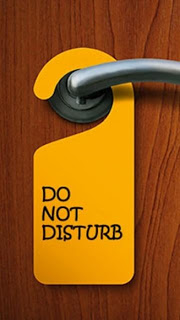Escaping the Information Deluge
by SebAlthough we are looking at eleven strategies for coping with information overload, they aren’t necessarily suitable to use all at once. This week’s strategy may be seen as the opposite of multitasking and is known as escaping. It is the ideal strategy to adopt when you need to cut out all distractions and focus 100% on one immensely important task.

|
| Photo Courtesy of http://btclounge.blogspot.ch/ |
Escaping is eliminating disturbances by psychologically or physically limiting disruptions from the outside world.
Disruptions and distractions cost time and productivity. Every time you are distracted, you lose focus on the task at hand, making you lose valuable time. You may even end up repeating finished work.
However, distractions have a far greater impact than we realise. Chronic disruptions in the workplace make it difficult to concentrate, think deeply, and be creative. This causes work place conflicts, inadequate performance, missed deadlines, poor customer relationships, and ultimately lost business.
The variety of distractions we are exposed to in the workplace are growing with the digital age. Along with traditional distractions, such as ad hoc meetings and talking with colleagues, we now have e-mail, text messages, instant messaging, and social media updates vying for our attention.
A 2011 survey on electronic distractions in the workplace conducted by Harmon.ie discovered that:
- 45% of employees only work for 15 minutes or less before getting interrupted
- 53% of employees waste an hour a day due to all types of distractions
- 57% of distractions are electronic, for example e-mails or instant messages
- 43% of distractions are personal, for example colleague queries or phone calls
The survey also showed that employees were likely to become distracted while switching between different applications and screens on their computer. 45% of employees said they usually had at least six items open simultaneously, and switched between all of these.
So how do we escape these distractions?
The first step in escaping your distractions is to identify exactly what they are. For some it may be obvious what the disruptions are; nevertheless the following exercise is worth doing. It often yields some surprising results.
Escaping exercise: Create a distraction log at work every day for a week.
- Keep a note of each and every distraction, whether it is an external, physical distraction or even an internal, emotional distraction such as a thought or feeling.
- Write down what the distraction was, what time you were distracted, how long the distraction took to resolve, and what the source was.
- Add up the amount of time you were distracted each day and try to identify patterns over the week. It may be that one source provides the majority of your distraction, or there may be a combination of sources at different times of the day.
Escaping physical distractions
Once you have completed a distraction log, you will have a better idea of the sources of your distractions, and you can implement strategies to escape from them. Emotional distractions are more difficult to escape from.This usually involves addressing the issue that is leading to distracting thoughts and feelings. On the other hand, escaping from physical distractions is usually simple. Here are a few ways to escape physical distractions:
- Close the door. An open door policy is very nice, but if you have a stream of colleagues in your office, you’ll never actually get anything done. Set aside certain times of the day to close your door and get on with your own work. You can even use a “Do Not Disturb” sign. If you work in an open plan office, book a meeting room or work outside of the office when you need to concentrate on a task. You can also block out the noise of a busy office using sound-reducing or noise-canceling headphones.
- Unplug the phone. So this phrase may be out-of-date now that everyone uses mobile phones, but the sentiment remains the same. Switch off your handset or put it in another room to reduce distractions from calls, text messages, e-mails, and social network updates. Of course this might be inappropriate if answering the phone promptly is an important part of your job.
- Eliminate e-mail. Many of us are addicted, checking for incoming mail every few minutes. The most efficient way to check e-mail is in batches, perhaps two to three times per day, and process all of your new messages in one go. Close down your e-mail when you aren’t actively checking it and turn off automatic notifications.
- Clear your desk. A clear desk policy means you only have material related to the task at hand in front of you, therefore removing the distraction of other items. The same should apply to your computer. Instead of having five different pieces of work or applications open at a time, have only the ones that you are using for the current job.
As we said at the beginning, escaping won’t work all day every day. It’s unlikely you can succeed in the office by ignoring e-mails, keeping your door permanently closed, letting every call go to voicemail, or continually wearing headphones. But if you need to strap down and focus, these methods will certainly help you escape the information deluge and finish the job.





